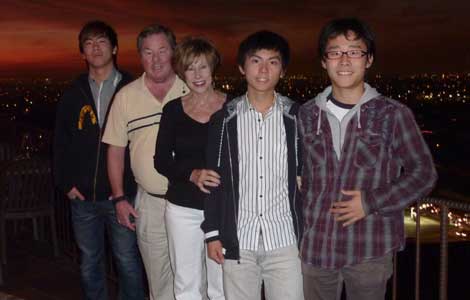Society
No friends, a hard fit
Updated: 2011-06-20 08:01
By Wang Jun (China Daily)
|
 Dennis Wang (left), Micheal Cheng from Tiawan (second from right), and Kai Matsuka from Japan (right) pose with their host parents, Alan and Michele Howard. Provided to China Daily |
More Chinese students are flocking to the United States for a high school education, but they face problems beyond the language and culture shock. Wang Jun reports.
Dennis Wang and Herman Qiao, both 18, are absolutely sick of being in the United States. "We don't want to spend a single day more than necessary in the US," says Wang, who speaks with a bit of tediousness in his voice, has his stylish hair dyed yellow and is holding a box of Hongtashan cigarettes in his hand.
Sitting in front of a Starbucks at a shopping center in Irvine, California, the two describe how they became friends after an international student agency sent them to the US two years ago to study at Crean Lutheran South High School in the Irvine area. Though both are 18 and finished the 10th grade in China, both had to repeat the 10th grade in the US.
Now, both admit they don't feel like they belong in the States. Each has been counting down to the end of the semester. Qiao is planning to fly back to his hometown of Shenyang in Northeast China on the last day of school. Wang is heading back to his hometown of Tianjin.
Both, like many Chinese students who have come to the US for a high school education, feel a sense of being lost, isolation and of not being integrated into the social spheres at their high schools at a time when many students that age are finding out who they are.
"Many of my Chinese schoolmates plan (to fly back to their hometowns)," Qiao says.
But a permanent escape from the US might be tougher for the pair than they initially thought. Both of their parents, who apparently own businesses in China, are planning for the families to immigrate to the US through the EB-5 visa program, which gives foreign nationals the option of obtaining a green card by investing at least $500,000 in the US.
Overseas investment is increasingly attractive for affluent Chinese parents, according to a study on China's private wealth, published last December by Forbes China and China Construction Bank. Nearly 400,000 affluent Chinese people, each of whom has more than 10 million yuan ($1.54 million) in personal assets, according to the study, are looking to invest in the US to facilitate a visa.
The reason for the investment is simple: Securing a US-based education for their children.
It costs international students around $16,500 for annual tuition to Crean Lutheran, which includes tuition, fees to their international student service agency and living expenses. With fees for applying, registering, books and uniforms, it's about $23,000 a year.
The school can arrange for international students to stay with a host family, which costs $1,500 to $2,000 per month. The host family provides breakfast and dinner while students buy their own lunch at school. Local students paid $10,995 for the 2010-2011 school year, according to the school website. The amount roughly equals the median US household income calculated by the US Census Bureau.
But money is obviously not a problem for Wang and his parents. School, on the other hand, has been a headache.
"High school is a totally different concept here," says Qiao, his voice betraying how lost he feels at times.
"We were told going to school in the US is like playing, but it doesn't turn out that way. It's very hard - still a lot of homework to do. What's even worse is nobody would bother to watch over your shoulder and push you to study."
Historically, Chinese people came to the US after college, but an increasing number of Chinese are coming over for a high school education.
Wang says that in China, parents and teachers own the children's problems, but in the US high school students are expected to take the initiative to reach out for help and find solutions for their own problems.
He says there is only one counselors for more than 100 international students at his school. Chinese students are generally not that proactive to approach counselor or teachers for advice and for Wang and Qiao, they says they often choose to just swallow up their conflicts or problems.
After high school, Qiao plans to attend the University of California, Irvine, located in Orange County, known for its affluent population. The Chinese population in Irvine, according to the most recent census figures, is 25,507 as of 2008. Irvine had a population of 196,895 in that year.
When he gets there, he will find that there is a growing number of international students in both California and across the US. The Open Doors annual report released last November by the Institute of International Education finds a 3-percent growth in the number of international students in the US over the 2009-2010 academic year.
"This year's growth was primarily driven by a 30 percent increase in Chinese student enrollment in the United States to a total of nearly 128,000 students, or more than 18 percent of the total international student population, making China the leading sending country," according to the report.
Wang Linlin, 17, is one example of a Chinese student who is looking to not only study in the US but secure a green card through the EB-5 visa. She says she has been studying at a private high school in Orange County for almost two years.
"My mom would like to get me a green card by investment and buy me a house here if I decide I like this country and would stay for a while," she says.
Wang Linlin's mom, Lin Min, who owns multiple businesses in China, came up with the plan though she says it's been tough because of the US' more stringent immigration policies. About 50 Chinese students like Wang Linlin attend the same school.
Besides the language and cultural shock, she says: "We don't have friends."
Wang Linlin's problems are strikingly similar to that of Dennis Wang's and Herman Qiao's. Many of Wang Linlin's friends are also not interested in extracurricular activities, which often make a college application look more appealing.
Often times, these activities, such as volunteering at a shelter, provide not only glitz to an application but create opportunities to make friends with people of their age.
Michelle Howard, whose family is hosting Dennis Wang, says she worries about "her Chinese boy" who moved into her house about a year ago.
"He hardly speaks English," Howard says. "Dennis' father is a real estate developer in Beijing, very rich."
Howard says Dennis Wang has more than 20 pairs of designer shoes and just had a 40-inch screen installed on the wall of his tiny room for video games.
"He has built up a Chinese world around him," Howard says.
On many weekends, Dennis Wang is out of the house partying with his Chinese friends at someone else's house, free from adult supervision. That can be a bad formula for destruction, says George Zhao, who used to be a Chinese student host in Southern California.
"These young people will run into trouble," he says.
"It would be a surprise if they don't."
E-paper

Pret-a-design
China is taking bigger strides to become a force in fashion.
Lasting Spirit
Running with the Beijingers
A twist in the tale
Specials

My China story
Foreign readers are invited to share your China stories.

Mom’s the word
Italian expat struggles with learning English and experiences the joys of motherhood again.

Lenovo's challenge
Computer maker takes on iconic brand apple with range of stylish, popular products
